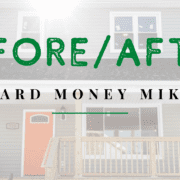Private Money vs Hard Money: Is There a Difference?
There’s no technical difference between private money vs hard money… Or is there?
As a real estate investor, one of your main goals is to get the best leverage possible. You want lower down payments, interest rates, and fees.
But who’s going to give you that best leverage? Private money lenders, or hard money lenders?
In fact, is there a difference at all between these two lender types? Let’s take a look at private money vs hard money and see who you should go to for the best prices.
What’s the Difference Between Hard Money & Private Money?
Firstly, what’s the difference?
Here’s the thing: private money loans and hard money loans are usually used interchangeably. There’s no clear-cut definition between them.
Both types of lenders ultimately do the same thing – they lend money based on an asset for real estate investing.
Okay, But What’s the REAL Difference?
Although private money and hard money are the same concept, each word has different connotations in the real estate investment community.
We’ve found that people typically associate local lenders with hard money. And they consider capital corporations – the capital funds off Wall Street – private money lenders.
Again, we’re doing the same thing. We’re lending money based on an asset for real estate.
So why are we making such a big deal about the difference? Although they’re the “same” thing, the requirements and costs of each type of money can be vastly different.
Let’s look at what we’ve found about the experience of a private money lender vs a hard money lender.
The Hard Money Experience
People tend to have a poor perception of hard money. They assume hard money = loan sharking. That hard money lenders will get you into a bad deal just for the sake of profiting off you.
The reality is quite the opposite.
Local hard money lenders make money when you make money. They want you to be a successful investor.
Therefore, hard money is flexible in the type of deals they’ll look at and the type of help they offer. They’ll do gap funding and second positions; they may offer bridge loans for saving flips that have gone bad. They’re not strict on credit score requirements, and they often don’t even require an appraisal.
The Private Money Experience
Typically, Wall Street private money lenders are “box” lenders. That means anything that doesn’t fit in their box, they will not do.
Private money also tends to be a bit pricier. We’ll share a story to describe this.
Mike did a group meeting for a real estate investor in Boulder, CO. He went over the hard money loans that we could do. At the end, someone brought up the common question: “What’s the difference between hard money and private money?”
The organizer of the event stepped in. He said, “I’ll tell you what the difference is. I used a capital company. I used someone from Wall Street.” And he shared their terms.
And guess what?
He was putting 5% more down than a hard money lender would require. He was paying a 1% higher interest rate and over $1,200 more in fees. …All because he wanted to be able to say he was working with a capital fund private lender.
We see clients who share a similar story. People lose money on projects by not looking at the exact costs and opting for the bigger name instead.
Which Is Better – Private Money or Hard Money?
So, to determine what’s best for you, you need to look at all the numbers.
- How long will each loan take? How much will a slow close cost you?
- What do you need to put for a down payment?
- Do I meet the credit score requirements?
- What are the rates?
- What are the fees/points?
Invest by the numbers, not by the names.
To make this part of the process easier for you, we have a free loan optimizer download for you. For your next project, do this:
- Go to three different lenders – a mix of private and hard money.
- Get all the numbers from them for what they’ll offer on your deal.
- Plug those numbers into the calculator.
- Compare the final costs the calculator gives you to determine the cheapest loan.
Why do you have to be so rigorous with numbers? When it comes to private money vs hard money, the cheaper option up front often isn’t the cheaper option overall. The lender with lower interest rates might slip in more junk fees. The one who charges zero points could have upwards of 12% interest rates. The only way to find the best loan for your deal is to use a tool and do the calculations.
I Might Want a Loan
Need a real estate loan? We want you to get the best one possible. Leverage makes your real estate world go round, and the cheaper you can get it, the more successful your business.
Reach out to us with a deal at Info@HardMoneyMike.com.
For more real estate investing resources, check out the videos on our YouTube channel.











Leave a Reply
Want to join the discussion?Feel free to contribute!